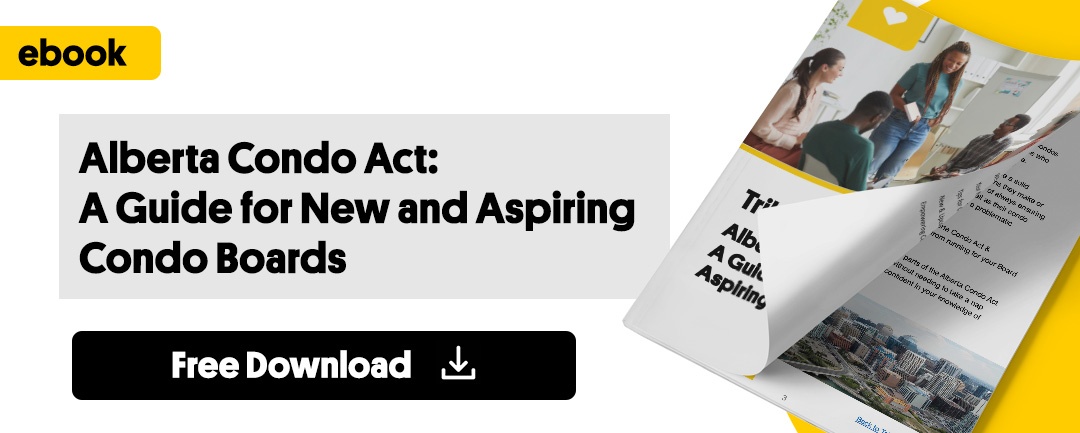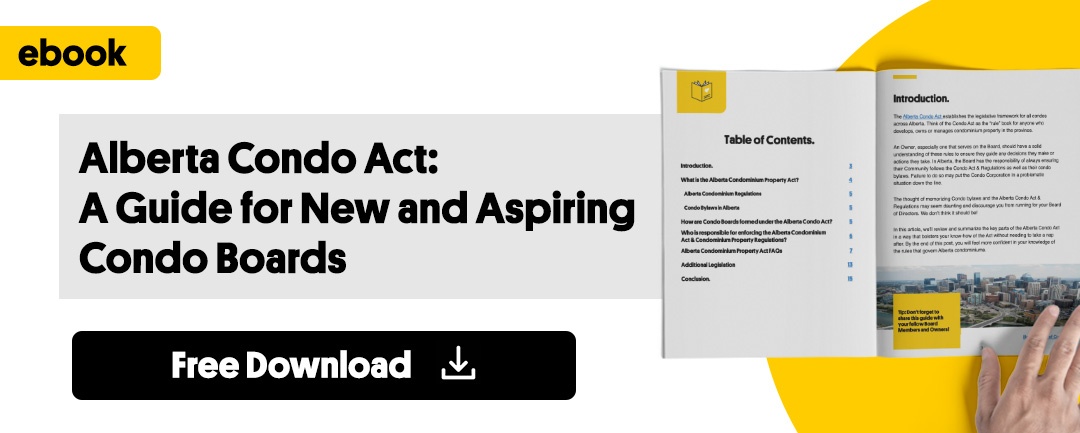
Alberta Condo Act: A Guide for New and Aspiring Condo Boards
The Alberta Condo Act establishes the legislative framework for all condos across Alberta. Think of the Condo Act as the “rule” book for anyone who develops, owns or manages condominium property in the province.
An Owner, especially one that serves on the Board, should have a solid understanding of these rules to ensure they guide any decisions they make or actions they take. In Alberta, the Board has the responsibility of always ensuring their Community follows the Condo Act & Regulations as well as their condo bylaws. Failure to do so may put the Condo Corporation in a problematic situation down the line.
The thought of memorizing Condo bylaws and the Alberta Condo Act & Regulations may seem daunting and discourage you from running for your Board of Directors. We don’t think it should be!
In this article, we’ll review and summarize the key parts of the Alberta Condo Act in a way that bolsters your know-how of the Act without needing to take a nap after. By the end of this post, you will feel more confident in your knowledge of the rules that govern Alberta condominiums.
Table of Contents
-
What is the Alberta Condominium Property Act?
-
Alberta Condominium Regulations
-
Condo Bylaws in Alberta
-
How are Condo Boards formed under the Alberta Condo Act?
-
Who is responsible for enforcing the Alberta Condominium Act & Condominium Property Regulations?
-
Alberta Condominium Property Act FAQs
-
Additional Legislation
-
Conclusion
What is the Alberta Condominium Property Act?
As previously noted, the Condominium Property Act is the legal framework for the establishment and operation of condos in Alberta. The Act applies to all types of condos such as conventional high-rise apartment properties or bare land townhome-style properties. This government-mandated Act applies equally whether you are a Condo Owner, Property Manager or Condo Developer.
The Condo Act also outlines the duties and responsibilities of condo corporations, including the requirements for annual budgets, financial statements and the rules governing the management of condo common areas.
The Act provides comprehensive and detailed guidance on a range of issues related to condos and condo life in Alberta. For example, the Act outlines the process for establishing a condo board, the rules for board meetings, and the rules for resolving disputes between condo owners and the board.
Alberta Condominium Regulations
The Alberta Condominium Regulations go hand in hand with the Alberta condominium act. While the Act provides the framework, the Regulations provide the specific requirements and forms to accompany the Act.
“If you think of the Act and Regulations as a cake recipe, the Alberta Condo Act would be the ingredient list and the Regulations would be the detailed recipe instructions. Follow the recipe and you end up with a delicious dessert – or in our case a well governed Condo Corporation”
The Alberta Condominium Property Act Regulations also include the Initial Bylaws referenced in Section 33 of the Alberta Condo Act. Labelled as Schedule 4, these are the default rules of a Condominium Corporation when it is created. They remain in effect as is until a special resolution is passed either to amend them or replace them entirely.
Not sure what a special resolution is? No need to worry; we've got you covered later in this article.
Condo Bylaws in Alberta
Bylaws provide specific rules for how a condo corporation is run. As mentioned above, every condominium has the same set of Bylaws upon creation. As the initial bylaws are quite general, most condominiums choose to update them to better reflect their community’s values and principles. A few examples of amendments we have seen include changes such as:
- Increasing the amount of notice required for Annual General Meetings
- Establishing a senior (+55) only building
- Specifying the types of pets allowed in units
A condo’s Bylaws must be followed by Owners as well as tenants who reside in the building. If there is a conflict between a bylaw and the Condominium Property Act and the Condominium Property Regulation, the Act or Regulation will prevail.
How are Condo Boards formed under the Alberta Condo Act?
A Board of Directors is a group of hardworking volunteers who run the Condominium Corporation on behalf of all Owners. The Board is elected by unit Owners at the Community’s annual general meeting (AGM). A condominium’s bylaws, along with the Alberta Condo Act, provide specific rules which determine the composition of the Board such as:
- Eligibility to sit on the Board.
- Length of a Director’s term
- Number of members on the Board (minimum of 3)
We encourage you to read our Alberta Condo Board Guide to Success to learn more about Board responsibilities, roles and frequently asked questions.

Who is responsible for enforcing the Alberta Condominium Act & Condominium Property Regulations?
The Condo Board is obligated to enforce the Alberta Condominium Act and Regulations within their Community in addition to their Condominium’s bylaws. The Regulations outline what paths a Board may take to seek compliance depending on the nature of the issue.
Generally speaking, enforcement begins with a written notice (e-mail or letter post) to the Owner(s) detailing the believed contravention. The Owner must be given a period of at least 3 days to respond to the notice. If the owner has not responded and the period is over, the Condo Board will determine the next steps such as additional notices, monetary sanctions, etc.
Simply put, while the Alberta Condo Act & Regulations apply to everyone, only the Community’s Board of Directors can enforce them. If your Community has engaged a Property Manager, they will be responsible for the receiving and tracking of contraventions as well as the issuing of notices.
However, it is important to note that the Property Manager acts on behalf of the Board and any actions (such as a notice) are only undertaken at their direction. Contraventions are discussed at a regular Board meeting and a plan of action can be formed with the community's best interests in mind.
As a new or aspiring Condo Board member it’s important to learn about the Condo Board Roles and Responsibilities.
Alberta Condominium Property Act FAQs
We’ve spoken with our Community Managers in Alberta to learn what Condo Boards and Owners should know and the most common questions they’ve been asked about the Alberta Condo Act.
What is a bare land Condo?
Did you know there are two types of condos in Alberta; conventional and bare land?
- Conventional condos such as a unit in a high-rise are quite well-known by the average person. In this type of condo, you generally own everything within the walls of your Unit. Everything outside, like the elevator or the roof, is common property.
- Bare land condominiums are less common and are not widely known. In a bare land condo, you own the actual land along with everything built upon it like the building, decks, driveways etc. A common type of bare land condo is townhomes, but they also can be single-family homes. Some examples of common areas for bare land condos are roadways, rec centers, or playgrounds.
Is there a charge to view my condo documents?
Documents like the AGM minutes, budget, insurance and financials are automatically distributed to Owners at no cost as outlined in the Condo Regulations. However, the Alberta Condo Act does allow a fee to be charged for other documents which are specifically listed in Section 20.53 of the Condominium Property Act Regulations.
Did you know? At Tribe, we believe a healthy relationship is one built on solid communication, trust, and transparency. For this reason, our communities can access their documents 24/7 at no cost using Tribe Home.
What are information statements and estoppel certificates?
These documents can be requested by an Owner, Realtor, Lawyer or mortgagee and are typically in relation to the sale or remortgage of a unit.
Information Statement – this document can also be known as a disclosure statement. This document includes several statements pertaining to both the specific Unit and the Corporation. For example, it includes a statement setting out the amount of the monthly condo fees for the Unit and how they are determined.
Estoppel Certificate – Most often ordered by the seller’s lawyer, this document certifies there are no arrears on the Unit as of the closing date. It also confirms the monthly contributions and when they are due.
The above documents are binding legal documents for a specific Unit. Once they have been requested, they must be prepared and provided within 10 days. Therefore, these documents carry a cost which is payable by the requestor. Section 20.53 of the Condo Regulations specifies the fee amounts for these documents.
What is the difference between a condo bylaw and a condo policy?
Condo bylaws are the general guidelines for a Condo Corporation and are registered when the Corporation is created. They cover a large assortment of issues such as:
- Duties of Owners, the Board and the Corporation - Such as who is responsible for certain repairs, collecting condo fees, or entering into service contracts.
- Use and Occupancy Restrictions - Such as what types of pets, renovations or signage are permitted in a Unit.
- Condo governance – Such as board member terms, meeting procedures, and voting methods.
A Condo policy (sometimes called a rule) is created by the Condo Board and will complement a Bylaw.
A common example is a renovation policy. Where a Bylaw simply says renovations require Board approval, the Renovation Policy will outline the actual process & requirements for approval.
Property Managers can provide invaluable guidance to Condo Boards when they are considering a new policy or rule for their Community. With a building’s specific needs in mind a Property Manager can work with a Board to ensure an effective policy is created.
At Tribe, our Community Managers regularly advise on what has worked in different types of communities and, more importantly, what hasn’t. Well-thought-out rules and policies are essential for healthy community living.
What is a special resolution?
Earlier in this article, we promised to cover special resolutions and we keep our promises! There are two kinds of resolutions which can be done at a properly convened meeting or in writing:
- Ordinary Resolutions – In order to pass, an ordinary resolution only needs a majority vote (more than 50%) in favour. These resolutions often occur at Condo Board meetings and pertain to day-to-day operations. For example, an ordinary resolution would be used at a Board meeting when adopting or amending a condo policy.
- Special Resolutions – In order to pass a special resolution, a corporation requires approval of at least 75% of all Unit owners representing at least 75% of the total unit factors. The most common use of a special resolution is to make amendments to a condo’s bylaws.
The Alberta Condominium Act along with a Condominium’s Bylaws define who is eligible to vote on either kind of resolution.
What is Common Property, Exclusive Use Common Property, and Managed Property?
These terms found in the Act and your Bylaws are often used to differentiate which areas an Owner is responsible for vs. the Corporation. Those volunteering on a Board should be familiar with how different areas within their complex are defined.
- Common Property – this term refers to the property which is outside of the boundaries of individual condo units but is part of the condo building. In a high-rise style condo, some examples of common property would be a community room, the hallways, and the lobby.
- Exclusive Use Common Property – These areas, sometimes known as Exclusive Possession Areas, are common property that is for the exclusive use of one or more Units. Common examples would be balconies, untitled parking stalls or storage units.
- Managed Property - Most often seen in bare land condos, this term refers to property which an individual unit owns but the Corporation is required by the Bylaws to maintain. For example, in a townhome style bare land condo, managed property could include driveways and lawns within a Unit.
The costs of maintenance, repair and replacement of the above areas are included in your condo fees. As an Owner, Condo Board member (or both!), it’s important to know what condo fees cover.
What is a Standard Insurable Unit Description (SIUD)?
Under the Alberta Condo Act Condo Corporations must have a Standard Insurable Unit Description (SIUD) for any class of Unit included in their condominium plan.
The SIUD details what the standard Unit fixtures & finishings are in the building/complex and would be covered by the Condo Corporation’s insurance. For example, the SIUD would include details such as:
- Floor covering specifications
- Cabinet particulars
- Ceiling lighting fixtures
- And more!
What is the capital replacement reserve fund?
More commonly known as a Reserve Fund, it is a separate account held by a Condominium which covers the cost of major repairs or replacements of common property. The following are standard examples of reserve fund expenses:
- Parking Lot Resurfacing
- Elevator Modernization
- Building Boiler Replacement
At least every 5 years, a reserve fund report is done which includes:
- A list of the property and/or assets covered by the Reserve Fund
- The current condition of the property and/or assets covered by the Reserve Fund
- The estimated costs to repair or replace the above items.
- And more
The Board of Directors use this report to establish or update the Corporation’s Reserve Fund plan. The approved plan is used to determine what amount needs to be collected through owner’s condo fees. As part of our ongoing mission to inform Condo Boards and Owners in Alberta, we’ve prepared an in-depth article on condo fees and what you should know.
Why did my Property Management charge a special levy?
Let’s take a step back for a moment. A special levy, previously known as a special assessment, is an amount paid by Owners which is over and above their regular monthly fees.
The special levy may be for shortfalls in the Operating fund, emergency maintenance or a required increase to the Reserve Fund. Your Board of Directors is responsible for determining the following for a special levy:
- The purpose
- The total amount
- The payment terms & due date
Once a Condo Board has passed a special levy, they are required to notify Owners. If your Community has a Property Management company, they typically handle the distribution of the notice and collection of the levy.
Can a Condo Board request a deposit if I am renting my Unit?
The short answer is yes. The Alberta Condo Act allows condo corporations to charge a rental deposit equal to $1000 or one month’s rent, whichever is greater.
A rental deposit requested by a condo is not the same as the security deposit you may collect from your tenant. The deposit is held by the condo for as long as your Unit is rented. The rental deposit is only returned to the Owner when written notification is received that the unit is no longer rented.
The rental deposit is used to pay for any damage to the common property caused by a tenant. If the condo uses the rental deposit, it must provide the Owner with back-up detailing the damages and repair costs.
It should also be noted that Owners are required to notify their condo if they decide to rent their Unit. The notification must include the Owner’s address of service, the amount of rent being charged and the tenant(s) name. A revised notice is submitted anytime there is a change in tenancy. Many condos have rental policies that include forms to be used when submitting information.
Additional Legislation to the Alberta Condo Act
The Condo Act of Alberta certainly is the main piece of legislation impacting Condo Boards and Owners. However, there are several other supporting pieces of legislation to keep in mind as well.
These Acts prohibit discrimination in various contexts in Alberta & Canada. They outline the processes for making and resolving complaints of discrimination.
This Act makes home warranty coverage mandatory for new homes and strengthens protections of new home buyers.
PIPA aims to address privacy issues and concerns in the private sector, including Condo Corporations.
This Provincial act regulates Landlord and Tenant relations in Alberta.
This Act legislates the real estate industry including Property Managers. The Real Estate Council of Alberta (RECA) administers the Act on behalf of the Alberta government.
Conclusion
The Alberta Condominium Act is an essential piece of legislation for Condo Owners and Board Members. However, it can be hard to follow for most people. Committing every section, part and regulation to memory would be nearly impossible!
We hope we've made the Alberta Condo Act easier to navigate for Condo Board members like you and empowered you to feel confident in your roles.
A licensed and trained Property Manager can be a tremendous asset to a Condo Corporation. Not only do they oversee the day-to-day operations of a community, but they also provide valuable guidance ensuring Condo Boards understand and comply with the Act. Condo Managers are required to hold a license as per the Real Estate Act. Boards can easily review the status of a license through the Real Estate Council of Alberta's Licensee Search Tool.
We have made it our goal to inform, educate and support Condo Owners & Boards across Alberta. By creating educational content such as this we hope to make condos more understandable and accessible to everyone. It’s all part of our mission to provide Community Management with Heart and part of what makes us different from other Property Management Companies.
Empower your Community - Share this Article!


.png?width=541&height=319&name=Tribe-Home-Product-Mockup_Laptop_2021_Amenities-Community-Documents-1%20(1).png)



.jpg?width=352&name=Blog%20Featured%20Image%20(7).jpg)
